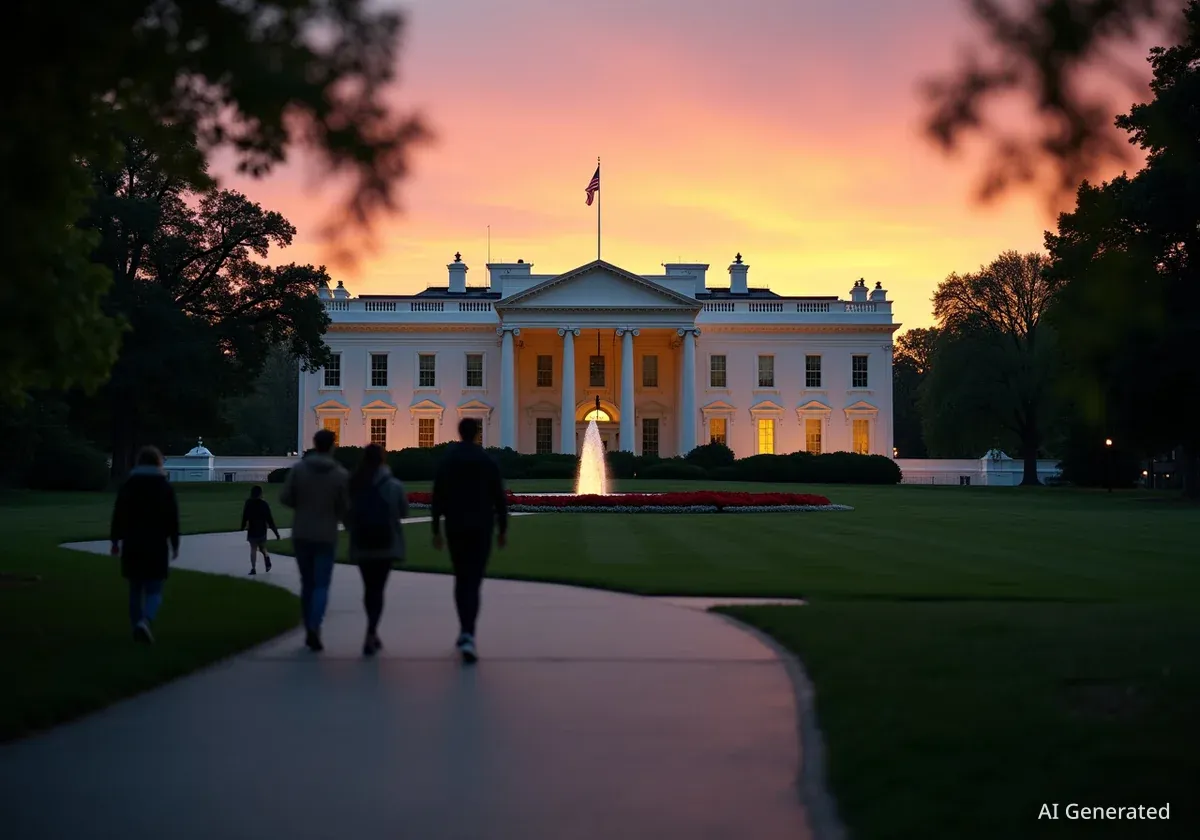The White House has approached nine prominent American universities, including Dartmouth College, with a proposal for a "Compact for Academic Excellence in Higher Education." The agreement offers funding benefits in exchange for adopting a specific set of policies on admissions, tuition, and enrollment, according to a report from The Wall Street Journal.
Key Takeaways
- The White House has offered a funding agreement to nine universities, including three Ivy League institutions.
- The proposed "Compact for Academic Excellence" requires a five-year tuition freeze and a ban on using race or sex in admissions.
- Other terms include a 15% cap on international undergraduate students and mandatory standardized testing for applicants.
- Violating the agreement could force universities to return all federal funding and private donations for that year.
Details of the Proposed Compact
The federal government has extended an offer to nine universities to enter into a formal agreement that would significantly alter their operational policies. The proposal, named the “Compact for Academic Excellence in Higher Education,” links federal funding benefits to a series of stringent requirements.
According to the Wall Street Journal, institutions that sign the compact would be required to implement five key policy changes:
- Admissions and Hiring: Ban the use of race or sex in all hiring and student admissions processes.
- Tuition Freeze: Freeze all tuition rates for a period of five years.
- International Enrollment: Cap the number of international undergraduate students at 15% of the total student body.
- Standardized Testing: Mandate that all applicants submit scores from the SAT or a similar standardized test.
- Grade Inflation: Implement measures to quell grade inflation on campus.
The proposal comes after years of public debate over the role of affirmative action, the rising cost of higher education, and the value of standardized testing in the college admissions process. The terms laid out in the compact directly address these contentious issues.
Rationale for Selection
The universities were chosen because the administration believes they “are, or could be, ‘good actors,’” said May Mailman, a senior adviser for special projects, in a statement to the Wall Street Journal. This suggests the administration is targeting institutions it views as potentially aligned with its policy goals.
Financial Stakes and Penalties
The agreement carries significant financial implications for the participating universities. While the specific funding benefits were not detailed in the initial report, the penalties for non-compliance are severe. A university that signs the compact and later violates its terms could face a substantial financial clawback.
The Wall Street Journal reported that a violation would compel the institution to return “any money” received from the federal government “that year.” Furthermore, the penalty would extend to private funding, requiring the university to also return “any private contributions” received during the same period. This dual penalty on both public and private funds represents a powerful enforcement mechanism.
A spokesperson for Dartmouth College declined to comment on the proposal. The White House has not yet responded to requests for comment on the matter.
Universities Contacted and Recent Context
The White House sent letters to a mix of elite private and major public universities. The full list of institutions that received the proposal includes:
- Brown University
- Dartmouth College
- Massachusetts Institute of Technology (MIT)
- University of Pennsylvania
- University of Southern California (USC)
- Vanderbilt University
- University of Arizona
- University of Texas
- University of Virginia
Alignment with Existing Policies
Some of the proposed terms already align with recent policy shifts at some of the targeted schools. For example, Dartmouth College recently reinstated its standardized testing requirement for the Class of 2029. The college's international student population for the Class of 2029 is 15%, which meets the compact's proposed cap. The previous class, the Class of 2028, had an international student population of 16%.
Recent Agreements with the Administration
Several of the universities on the list have recently entered into agreements with the federal government to resolve investigations. On July 1, the University of Pennsylvania reached a deal with the Department of Education to adopt the administration's definition of sex as biological, which will prevent transgender women from competing in women's sports. Similarly, Brown University agreed on July 31 to adopt the administration's definitions of “male” and “female” to restore federal research funding and end discrimination investigations, according to National Public Radio.
A Divisive Political Landscape
The outreach to these nine universities also appears to have a political dimension. Of the nine institutions contacted, the presidents of five, including Dartmouth's, did not sign an April 22 letter from the American Association of Colleges and Universities. That letter was critical of the Trump administration for revoking federal funding from some universities.
The compact's proposal to ban race and sex in admissions follows the Supreme Court's 2023 ruling that struck down affirmative action in college admissions. The administration's proposal seeks to codify and expand upon this by including hiring practices and tying compliance directly to all sources of funding.
The proposal represents a new approach by the executive branch to influence the policies of higher education institutions, using the powerful leverage of federal and private funding to encourage adoption of its preferred academic and administrative standards.





